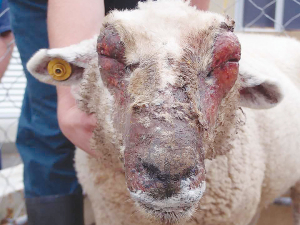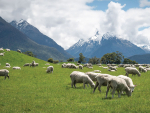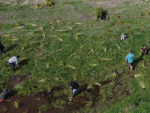A disease that costs the primary industry more than $200 million a year is potentially coming to a place near you soon.
Facial eczema (FE) is a disease that affects livestock and can only be prevented but never cured. In some cases, it strikes animals before the symptoms are recognisable.
Dr Kristina Mueller from Massey University’s School of Veterinarian Science says while at present there are only serious outbreaks in about 10% of the country, it’s time for farmers to start watching for signs of it and paying close attention to the condition in which it thrives – namely humid circumstances.
“This is the time of the year when we start spore count monitoring, including sending grass samples to Gribbles, a nationwide laboratory that analyses grass samples and provides spore count readings, which warn farmers about the need to act quickly. They can also take samples to their local vets, most of whom will also analyse samples,” she says.
FE is a disease that causes liver damage, lowers production, causes skin irritation and peeling, and sometimes death. It is caused by a toxin (sporidesmin) produced by the spores of the fungus Pithomyces chartarum growing on pasture. The fungus grows in the dead litter at the base of pasture in warm moist conditions. When seen under a microscope, the spores look like tiny hand grenades.
Mueller says the key to prevention is having a well-prepared plan to deal with the disease – the same as a farmer would have for dealing with an adverse weather event. She says farmers should keep in touch with their local vet, who will be monitoring the situation and give them a clear picture about what is happening with FE in their district.
Mueller says when spore counts start to reach up to 20,000 to 30,000 per gram of pasture, that is a signal for farmers to take preventive measures.
She says, at present, there are some farms around the country with spores counts of up to 50,000, but at this stage, outbreaks of FE are patchy. She says the only way of dealing with FE is prevention and that includes spraying pasture with zinc.
“Research shows that putting zinc into stock water or water troughs is not particularly reliable and somewhat variable. We recommend the use of zinc boluses which are seen as far more reliable and give 100% protection when administered at the correct dose rate and time,” she says.
No Cure
As mentioned before, FE can be a deadly disease and once the liver of an animal is damaged there is no cure and the liver may never heal.
The damaged liver cannot get rid of a breakdown product of chlorophyll that builds up in the blood, causing sensitivity to sunlight, which in turn causes inflammation of the skin. As their skin becomes damaged, animals will seek shade. In the case of cows they may become restless and start licking their udder and milk production will drop.
Interestingly not all animals affected with FE show physical or clinical signs of the disease and it’s estimated that for every clinical case there will be 10 cows with subclinical FE.
The cost of FE to a farmer can be significant if they don’t prevent it. Mueller says DairyNZ has a calculator on its website that can tell a farmer what it might cost them. Like DairyNZ, Beef+Lamb NZ also have a very good website with lots of excellent information about facial eczema, as do Gribbles and local vets.
Once upon a time, FE was seen as a North Island disease, but research shows that it is moving south and so all farmers should be on the lookout in the coming months for it.



















